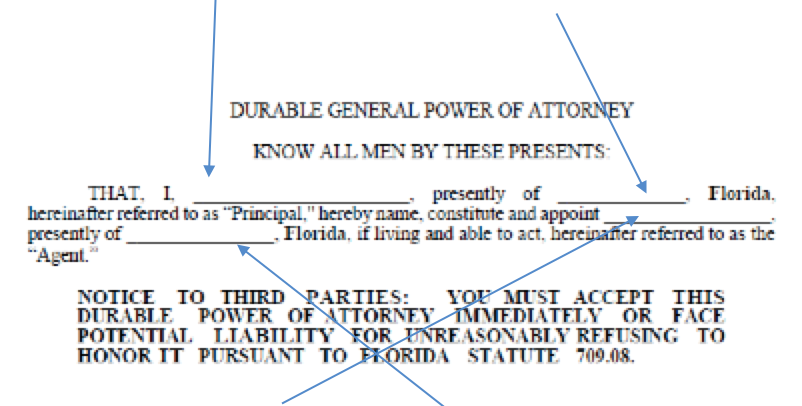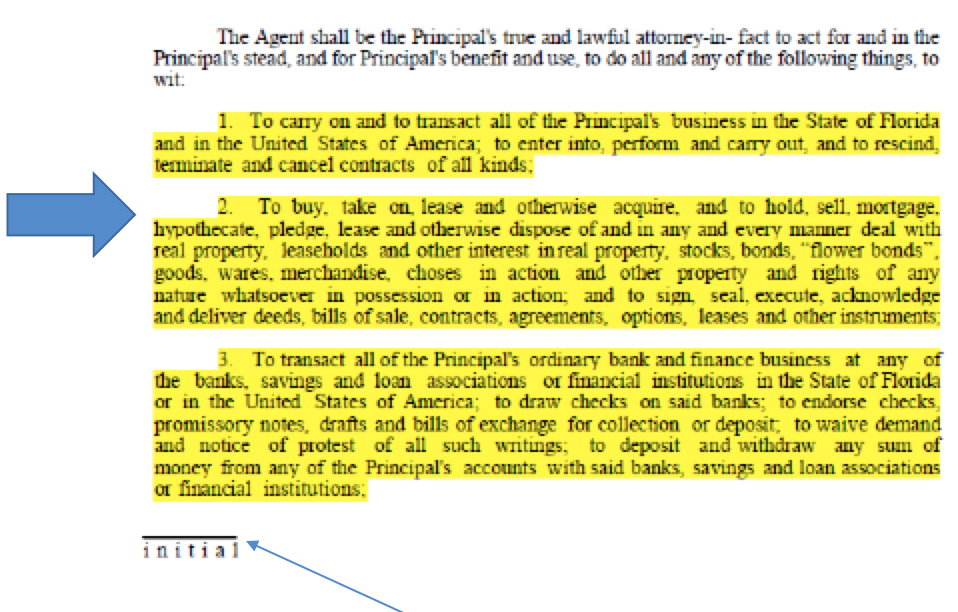FLORIDA DURABLE POWER OF ATTORNEY FORM
Before you download and sign our free Durable Power of Attorney form, please read the following facts as it is important to understand what is being signed. Here is the F.A.Q. you need to know:
WHAT IS IT: A power of attorney form grants someone else the authority to act in place of you. See Florida Statute § 709.2102(9).
HOW DOES IT WORK: The person granting authority is called the “principal.” The person who was granted authority is called the “agent.” You are allowed to have more than one agent, this is referred to as a “Co-Agent.” See Florida Statute § 709.2111.
WHY DO PEOPLE USE THESE: In most circumstances, these forms are used to allow someone else to make decisions for them, most commonly due to deteriorating health or incapacity. Incapacity is defined under Florida law as “inability of an individual to take those actions necessary to obtain, administer, and dispose of real and personal property, intangible property, business property, benefits and income.” See Florida Statute § 709.2102(7).
IS A “DURABLE” POWER OF ATTORNEY DIFFERENT THAN JUST “POWER OF ATTORNEY”: Yes. The law recognizes a distinction between a “durable” power of attorney versus a regular power of attorney form. Durable means that the power of attorney form is not terminated by the principal’s incapacity. See Florida Statute § 709.2102 (4). To have a durable power of attorney, you should include the following words or something similar to show the intent to make the document “durable”: “This durable power of attorney is not terminated by subsequent incapacity of the principal except as provided in chapter 709, Florida Statutes.” See Florida Statute § 709.2104.
WHAT TYPE OF THINGS CAN THE AGENT DO: In most circumstances, the agent is only allowed to exercise the authority specifically granted to the agent in the power of attorney form and acts reasonably necessary to give effect to what has been granted. See Florida Statute § 709.2201(1). It is important that the form specifically authorizes what the agent can do for the principal. General provisions which do not identify the specific authority granted are not recommended. For example, a power of attorney that simply provides the agent “with authority to do all acts the principal can do” will not be specific enough to be enforceable.
DOES AN AGENT HAVE OBLIGATIONS: Yes. The agent is a “fiduciary” to the principal and therefore must act within the scope of the power of attorney form, must act in good faith, and should be acting in the principal’s best interest. Florida law explicitly limits what an agent can do and prohibits the agent from doing certain acts. See Florida Statute § 709.2114 and § 709.2201(3).
DOES A POWER OF ATTORNEY WORK AFTER SOMEONE DIES: No. Once the principal has died, the power of attorney form is terminated. It is a common misconception that a power of attorney can be used to act on behalf of a deceased individual; however, Florida law is very clear that the powers afforded to the agent cease upon death. See Florida Statute § 709.2109(1)(a).
WHERE SHOULD I STORE THE POWER OF ATTORNEY FORM: The principal is not required to keep the form in any one place. A principal could hold onto the form until they need to use it, or they could provide a copy of the form to their agent.
A STEP-BY-STEP GUIDE TO COMPLETING A FLORIDA DURABLE POWER OF ATTORNEY FORM
Before you complete this form, please be aware of the two legal requirements to fill this out:
(1) This document will need to be signed by the principal and two witnesses before a notary. See Florida Statute § 709.2105. A notary public is appointed by the governor of Florida to sign records and administer oaths and can usually be located at your local post office or bank, please call them in advance to verify their availability.
(2) The agent must be a natural person over the age of 18 years old.
STEPS TO COMPLETING DURABLE POWER OF ATTORNEY FORM
STEP 1: Print Out the Free Durable Florida Power of Attorney Form. DOWNLOAD FORM HERE
STEP 2: On Page 1, fill out the name of the principal and city the principal lives. If you do not know who the “principal” is, you did not read our F.A.Q. above. Stop and go read the F.A.Q. at the top of this page.

STEP 3: On Page 1, fill out the name of the agent and city where the agent lives. If you do not know who the “agent” is, you did not read our F.A.Q. above. Stop and go read the F.A.Q. at the top of this page.
STEP 4: On the bottom of page 1, the next section is where the principal specifically grants the agent the ability to do certain acts on his or her behalf. See highlighted areas below as an example of the type of acts that an agent might be granted. This is just an example. The principal is the one who designates what the agent is specifically allowed to do.

STEP 5: Make sure the principal initials the bottom of each page.
STEP 6: Pages 2-4 are a continuation of the different acts that the principal might grant to the agent. Our suggestion is to go through each one with the principal and determine what the principal is agreeable to allow the agent to do. Again, make sure each page is initialed by the principal. Please note that this section is very important as it will determine what the agent can or cannot do for the principal and we suggest the principal review this very carefully.
STEP 7: Page 6 is the signature page which needs to be signed by the principal and two witnesses and the document needs to be notarized. At the bottom left, please indicate who prepared the document.
Disclaimer: Please note that supplying this information does not establish an attorney-client relationship. If you seek to have a lawyer review and/or assist you in completing these forms, please contact us at NextGen Injury Law and we would be happy to discuss how we may be able to help you.
